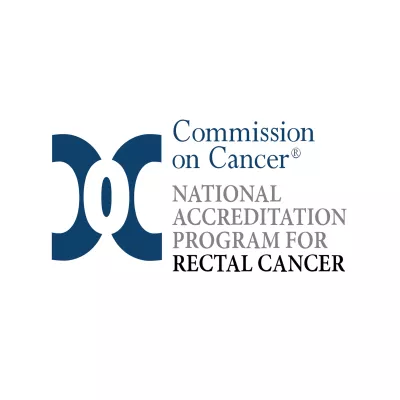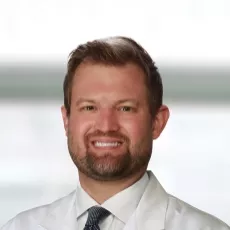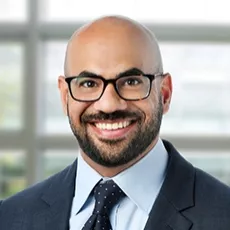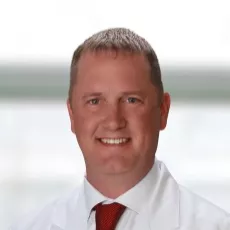
Leading the Way in Colorectal Surgery
Our team offers nationally recognized care as one of the first programs in the country to be named a Center of Excellence by the National Accreditation Program for Rectal Cancer (NAPRC). Additionally, AdventHealth Orlando is recognized by U.S. News & World Report as one of America’s best hospitals for gastroenterology and gastrointestinal surgery, and our colon and rectal surgery program uses the most advanced diagnostic technology to treat a broad spectrum of colorectal diseases.
As leaders in surgical research, training and innovation, we treat more than 500 patients with inflammatory bowel disease (IBD) each year as the primary referral center in Central Florida for patients with ulcerative colitis, and are advancing high-resolution anoscopy (HRA) care through the area’s first Anal Dysplasia Clinic. We pioneered transanal minimally invasive surgery (TAMIS) and robotic transanal surgery — techniques we teach leading surgeons and institutions worldwide.
Our team is here for you with the insight and experience to help you feel whole again.
We’re here to help you find the right physician or a location that’s convenient for you.
Central Florida’s Trusted Colorectal Expertise
Our experts are accomplished leaders in their fields, raising the bar for colorectal treatments here in Central Florida and the country. But more importantly, they’re caring physicians who take the time to get to know you, listen to you and help you overcome the complexities of your diagnosis with treatments that fit your needs.
Whether you’re facing a cancer diagnosis, have IBD concerns or need advanced treatments for anal dysplasia or another condition, count on our team for the expertise you deserve.
-
Inflammatory Bowel Disease (IBD)
A designated Center of Excellence, our IBD Center is at the forefront of treatments for IBD, Crohn’s disease, ulcerative colitis and other conditions.
-
Cancer Care
Our team treats colon cancer, rectal cancer (including recurrent colon/rectal cancer, also called colorectal cancer) and anal cancer with the utmost care.
-
Anorectal Disorders
With anorectal disorder care, our team pioneers advanced treatments for hemorrhoids, anal fissures, anal abscesses, anal fistulas and other anorectal disorders. Next-day appointments are now available for these conditions.
-
Pelvic Floor Dysfunction
Our board-certified team provides a multitude of diagnostic options, alternative therapies and advanced treatments for some of the most complex forms of pelvic floor disorders.
-
Anal Dysplasia
Our Anal Dysplasia Clinic is the only center in Central Florida offering near-4K high-resolution anoscopy (HRA), which helps to catch dysplasia early, before anal cancer can develop.
Nationally Recognized Colorectal Cancer Surgery
At the AdventHealth Digestive Health Institute, our Center of Excellence for Rectal Cancer is the only Center in the region with Commission on Cancer designation. No other facility in Florida or our neighboring states offers the same comprehensive care for our patients with the most challenging cancers.

One of America’s Best Rectal Cancer Care Programs
As one of the first programs in the nation to be named a Center of Excellence by the National Accreditation Program for Rectal Cancer (NAPRC), our team is committed to ensuring our patients with rectal cancer receive research-supported care from a multidisciplinary team.

National Leader in Digestive Care
AdventHealth Orlando is recognized by U.S. News & World Report as a nationally rated leader in gastroenterology and GI surgery.

National Leader in Colon Cancer Surgery
AdventHealth Orlando is recognized by U.S. News & World Report as one of America's best hospitals for colon cancer surgery.
Treating Colorectal Conditions, Keeping You Moving
A colorectal condition can lead to uncomfortable, painful and sometimes embarrassing symptoms. Our surgical team is here to help you feel your best with comprehensive care for common and complex conditions. Schedule an appointment now.
- Acute Rectal Pain
-
If you're experiencing severe rectal pain due to an anal fissure, hemorrhoids or other discomfort, we're here to help, offering next-day appointments for acute conditions. Schedule a next-day appointment now.
- Advanced Colon and Rectal Cancer Program
-
The AdventHealth Digestive Health Institute and the AdventHealth Medical Group Colorectal Surgery team now offer comprehensive services for patients with peritoneal surface malignancy. Our program provides specialized care for various advanced colorectal conditions, including peritoneal metastases.
Our program team is led by Christopher Aquina, MD, MPH, who is fellowship-trained in surgical oncology and colorectal surgery. Dr. Aquina is highly skilled in treating metastatic cancers originating from the appendix, colon, rectum, small bowel and peritoneal surface. He uses advanced treatment methods, such as cytoreductive surgery and hyperthermic intraperitoneal chemotherapy.
We take a multidisciplinary approach to peritoneal surface malignancy and colorectal cancer by including experts from colorectal surgery, hepatobiliary surgery, medical oncology and radiation oncology. We offer a wide range of services, including:
- Cytoreductive surgery and hyperthermic intraperitoneal chemoperfusion (CRS and HIPEC): these treat peritoneal surface malignancy, targeting peritoneal metastases of appendiceal, colorectal and ovarian origin, as well as peritoneal mesothelioma
- Multivisceral resection: a surgical procedure for locally advanced or recurrent colon cancer that involves removing multiple affected organs
- Pelvic exenteration: a surgical option for locally advanced or recurrent rectal cancer to remove the pelvic organs affected by the disease
- Liver resection and ablation: for colorectal cancer liver metastases, this addresses the spread of cancer to the liver through surgical removal or destruction of the affected tissue
Liver-directed therapies: hepatic artery infusion chemotherapy, transarterial chemoembolization/embolization (TACE/TAE), Y90 selective internal radiation therapy (SIRT) and stereotactic body radiation therapy (SBRT) are offered for unresectable colorectal cancer liver metastases
- Anal and Anorectal Disorders and Disease
-
Anal and anorectal disorders and diseases can affect the anus or where the anal canal and rectum meet. Our team is trained in diagnosing, treating and managing many of these conditions, including:
- Anal fistula
- Anal sexually transmitted infections (STIs) or diseases (STDs)
- Anal skin tags
- Anal trauma
- Anal ulcer
- Melanoma of the anus
- Paget’s disease of the anus
- Pilonidal disease, cyst or abscess
- Pruritis ani
- Radiation proctitis
- Retrorectal cyst
If you're experiencing severe pain due to any of the above, schedule a next-day appointment for acute conditions today.
- Anal Dysplasia
-
Anal dysplasia is a precancerous condition that’s typically caused by human papillomavirus (HPV). Diagnosing, treating and monitoring this condition is important to help prevent anal cancer from developing.
The AdventHealth Digestive Health Institute offers an Anal Dysplasia Clinic — the first of its kind in Central Florida — to ensure you get the care you need, when you need it. Our specialties include:
- Anal pap smear
- Anal warts and condyloma
- Colonoscopy
- HIV-related anorectal conditions
- High-resolution anoscopy (HRA)
- Non-invasive surgery
Our team is here to help you on your journey to whole health. If you’ve been diagnosed with anal dysplasia or are at risk, our providers can help keep you healthy and well.
- Anal Fissures
-
An anal fissure is a small tear in the tissue that lines the anus that’s typically caused by large or hard bowel movements over time. Individuals with an anal fissure may experience pain or bleeding during bowel movements.
We offer comprehensive care for diagnosing, treating and preventing anal fissures, especially if you experience recurring fissures or have difficulty treating it at home.
We’ll work with you to create a plan that gets you back to whole health. Your treatment may include:
- Blood pressure medicine to relax the anal sphincter
- BOTOX® injections (chemical sphincterotomy BOTOX®) to relax spasms
- RECTIV® prescription medicine (an externally applied nitroglycerin) to encourage healing
- Topical pain relief
Surgery may be recommended if you have a severe or recurring anal fissure. Our surgeons routinely perform sphincterotomy. During this procedure, your doctor will cut a small portion of the anal sphincter muscle. This helps reduce spasms and pain and encourages healing.
- Anal Warts
-
Anal warts are caused by human papillomavirus (HPV). Some common signs and symptoms may include:
- Bleeding or discharge from the anus
- Itching around the anus
- Lump in the anal area
- Warts on other body parts, including genital warts or in the mouth or throat
The Anal Dysplasia Clinic at the AdventHealth Digestive Health Institute offers comprehensive care for diagnosing, treating and preventing anal warts. Our clinic is a one-stop-shop for patients who are at risk of or who have precancerous or cancerous cells.
Your treatment may include:
- Cryotherapy
- Electrocautery
- Laser treatments
- Surgery
- Topical medications
Our team will work to understand which treatment options best meet your needs to start healing.
- Colon Polyps
-
A colon polyp is a small clump of cells that grows along the lining of the colon. Most of the time, polyps are benign, which means they aren’t cancerous. However, some polyps can turn into colon cancer.
A colonoscopy is the most effective screening tool for identifying, diagnosing and removing a colon polyp before it causes symptoms or grows into cancer.
Some people may also be at a higher risk because of genetic mutations that cause colon polyps. Those include:
- Familial adenomatous polyposis (FAP)
- Hereditary nonpolyposis colon carcinoma (HNPCC)
- MYH-associated polyposis
Polyps are typically discovered and removed during routine screening colonoscopies and diagnostic colonoscopies, so it’s essential to get these screenings. If you’re over age 50, have a personal or family history of colon polyps or cancer and have not had a colorectal screening, talk to your health care provider about a colorectal screening.
If you have a colon polyp, your surgeon will most likely recommend a procedure to remove the growth. This may include a polypectomy or minimally invasive surgery.
People with a genetic mutation may need a total proctocolectomy, a surgery to remove the colon and rectum.
- Hemorrhoids
-
Hemorrhoids are nothing to be embarrassed about. In fact, it’s estimated that 50% of people over the age of 50 experience them.
Left untreated, they can cause pain and discomfort. Fortunately, most hemorrhoids respond to conservative treatment at home, such as topical creams, eating a diet high in fiber, drinking plenty of water or taking over-the-counter medication.
However, if you have persistent, recurrent or large hemorrhoids, you may need more specialized care.
We offer many different treatment options, from conservative therapies to minimally invasive procedures and surgical care for hemorrhoids. Our treatments include:
- Hemorrhoid banding
- Hemorrhoidectomy
- Transanal hemorrhoidal dearterialization
- Pelvic Floor Dysfunction
-
Pelvic floor dysfunction refers to the inability to properly relax the pelvic floor muscles to have a bowel movement. It can also refer to loosening or weakening muscles that have allowed organs in the pelvis (including the uterus, bladder and rectum) to shift out of place.
Our team is here to help you get your life back. We offer comprehensive diagnostic tools to get a better idea of what’s causing your symptoms. We treat many different conditions related to pelvic floor dysfunction, including:
- Anal stenosis
- Anismus
- Fecal incontinence
- Rectal prolapse
- Rectocele
Once we have a clear diagnosis, we’ll work together to create a treatment plan that’s right for you. Today, you have more options than ever before, from prescription medications to injections that help relax or tighten muscles, and from minimally invasive procedures to innovative therapies.
Your physician will discuss which treatment is best to get you back to whole health. That may include:
- Pelvic floor disorder therapy
- Rectopexy
- Sacral nerve stimulator
Learn more about pelvic floor disorders.
- Rectal Bleeding
-
It can be alarming to experience rectal bleeding. But often, it’s nothing to be worried about. Bleeding can happen from constipation or straining too hard during a bowel movement. If you’re concerned about the amount of blood you see and the frequency you experience it, you should talk to your doctor to rule out other, more serious conditions.
At the AdventHealth Digestive Health Institute, we diagnose and treat many different conditions that can cause rectal bleeding, including:
- Anal fissures
- Cancer
- Crohn’s disease
- Constipation
- Diarrhea
- Diverticulosis and diverticulitis
- Inflammatory bowel disease (IBD)
- Hemorrhoids
- Proctitis
- Solitary rectal ulcer syndrome
Together, we’ll get to the root of your condition and create a treatment plan that helps you get back to what’s most important — enjoying and living your life.
Meet Your Colorectal Surgery Team

Matthew Ross Albert, MD, FACS, FASCRS
Colon and Rectal Surgery

Ashley Althoff, DO
Colon and Rectal Surgery

Christopher Aquina, MD
Colon and Rectal Surgery, Surgical Oncology

Navin Changoor, MD
Colon and Rectal Surgery

Teresa H deBeche-Adams, MD, FACS, FASCRS
Colon and Rectal Surgery, General Surgery

Jeremy M Drake, MD
Colon and Rectal Surgery, General Surgery

Rahila Essani, MD, FACS, FASCRS
Colon and Rectal Surgery

Luanne Force, MD, FACS, FASCRS
Colon and Rectal Surgery

Daniel Galante, DO, FACS, FASCRS
Colon and Rectal Surgery

Norbert Garcia-Henriquez, MD, FACS, FASCRS
Colon and Rectal Surgery

Ross Hempel, MD
Colon and Rectal Surgery

Justin Kelly, MD, FRCS, FEBS
Colon and Rectal Surgery
George Nassif, DO, FACS, FASCRS
Colon and Rectal Surgery, General Surgery

Andrew Ritter, MD, FACS, FASCRS
Colon and Rectal Surgery

Radhika Smith, MD, FACS
Colon and Rectal Surgery

Mark Soliman, MD, FACS, FASCRS
Colon and Rectal Surgery

Yaphet Tilahun, MD, FACS, FASCRS
Colon and Rectal Surgery, General Surgery

Timothy Tolland, MD, FACS, FASCRS
Colon and Rectal Surgery

Matthew Wilson, MD, FACS, FASCRS
Colon and Rectal Surgery

Revolutionary Colorectal Surgery
When it comes to your care, we want you to have options. That’s why our surgeons, providers, researchers and all caregivers are continually pushing the boundaries of what’s possible, to offer you the best care for your whole-person health.
The colorectal surgery team is no different. Transanal minimally invasive surgery (TAMIS) is a revolutionary procedure pioneered right here at AdventHealth. Designed to remove polyps and early cancers in the rectum, the procedure offers countless benefits, including faster recovery, less pain and fewer complications.
Previously, patients who needed cancerous growths or polyps removed may have needed their entire rectums removed through significant pelvic or abdominal surgery. Now, TAMIS, a procedure adopted around the world, is giving patients new hope.
Our team is also one of the few in Central Florida that performs transanal total mesorectal excision (taTME). This innovative approach allows your surgeon to remove lower rectal tumors with a smaller incision. And, the AdventHealth Digestive Health Institute is honored to share our experience with other physicians as one of the few North American training centers for taTME.
Colorectal Treatments You Can Trust
You want to live life to the fullest — free of pain and worries. We want that for you, too. That’s why we’ll work with you to help you reach your goals.
We research the latest advances in treatment. From proven non-surgical therapies to innovative minimally invasive procedures to complex surgeries, we’ll find the approach that’s right for you. And, depending on your treatment plan, we can help you heal without the use of opioid medications.
- Minimally Invasive Surgery for Colorectal Conditions
-
Advances in surgical care offer exciting new procedures for our patients. Today, you have more options than ever before to treat a wide range of colorectal conditions with minimally invasive procedures. These approaches often lead to less pain and a shorter recovery time, so you can get back to what matters most.
Your colorectal specialist will discuss if you’re a candidate for minimally invasive procedures. Some traditional procedures can now be performed with a minimally invasive approach, such as:
- Laparoscopic surgery
- Robotic surgery
- Transanal minimally invasive surgery (TAMIS)
- Transanal total mesorectal excision (taTME)
- Transanal endoscopic microsurgery (TEMS)
- Colorectal Surgical Procedures
-
Sometimes, surgery is required to treat colorectal or gastrointestinal disorders. If your provider recommends surgery, you can rest assured that you’re in good hands.
Our team has experience performing many different surgeries that will help you improve your quality of life, relieve symptoms and reduce pain.
Colorectal surgery available at the AdventHealth Digestive Health Institute includes (but is not limited to):
- Colostomy
- Colostomy reversal
- Ileostomy
- Ileostomy reversal
- Ostomy
- Ostomy reversal
- Stoma prolapse and reversal
- Pouch surgery and re-do pouch surgery
- Enterostomal Therapy (Ostomy Care)
-
For people who’ve had ostomy procedures — sometimes as part of their IBD treatment — our specialized nurses offer enterostomal therapy to care for stomas before and after surgery.
Learn more about enterostomal therapy as a part of IBD treatment.
- A Multidisciplinary Approach for the Best Outcomes
-
Colorectal conditions often call for a treatment approach with many different therapies to help heal your body, mind and spirit.
We work with providers, specialists and therapists across different disciplines to ensure you get the care you need, when you need it. Your care team will work closely with you to discuss different therapies that may be right for you. Often, we recommend these treatment paths alongside or before surgical intervention:
- Behavioral health support
- Exercise planning
- Pain management
- Pelvic floor disorder therapy
- Managing chronic health conditions
- Nutrition counseling
- Weight management
The Latest on Advances in Diagnosing, Managing Colorectal Conditions
Early Detection of Colorectal Cancer Can Save Lives
In light of Colorectal Cancer Awareness Month, we’re recognizing the risk factors and preventive measures that can reduce your risk.

Why You Shouldn't Put Off Your Colorectal Cancer Screening
Colon cancer is the third-leading cause of cancer-related death. And successful treatment can depend on how early the cancer was detected. That’s why it’s so important to have regular screenings —...


